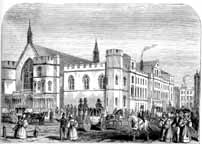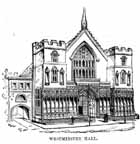The fire originated in an act of gross folly and most culpable negligence on the part of certain subordinate officials connected with the Board of Works, and their workmen. Orders had been issued by the Treasury to remove or destroy the tallies formerly used in the Court of Exchequer. The orders passed through two or three hands, and the duty wvas ultimately intrusted to a workman of the name of Cross, with directions to burn the tallies slowly and carefully. No pains were taken, however, by any of his superiors to see that these orders were obeyed; and Cross and a fellow-workman, impatient to finish their task, threw the tallies in great numbers into the furnaces. The housekeeper repeatedly warned them that the heat had become intense, and that the House of Lords was full of smoke; but they paid no attention to her remonstrances, The workmen left the building about five o'clock, and an hour later it was discovered to be on fire in several places, in consequence of the heated flues having been in contact with some old dry timber.


Left: The House of Commons before the Conflagration of 1834. From an old print.
Right: Westminster Hall. [Click on thumbnails for larger images.]
The flames spread with such rapidity that in a few minutes the two Houses and the offices belouging to them were wrapped in one resistless coilflagration. Melbourne, althorp, and other members of the Cabinet, were quickly on the spot, directing the firemen and the police in their efforts to limit the ravages of the fire ; and every street leading towards Palace Yard was thronged with dense crowds of spectators. It soon became evident that it was impossible to save the Parliament Houses, and the efforts of the firemen were directed to the preservation of Westminster Hall -- the venerable structure of William Rufus -- which was in imminent peril.
In this they were fortunately successful; but the two Houses, with the greater part of their libraries, together with man works of art and valuable records, and the ancient tapestry of the House of Lords representing the attack and overthrow of the Spanish Armada, memorable for the famous allusion to it in one of Lord Chatham's eloquent speeches, were all destroyed.
The accommodation which the building afforded to the Commons had become quite inadequate and exceedingly inconvenient, and must at no distant day have been replaced by a new structure. But it was impossible for even the most prosaic utilitarian not to feel regret at the destruction of the old oak-panelled chapel, associated with so many historical reminiscences of momentous incidents, and the memories of the most famous statesmen and orators of our country. As a temporary expedient for the accommodation of Parliament it was found that the old Painted Chamber could be fitted up for the reception of the Peers; and as the walls of the old House of Lords were still standing, they could without difficulty or much expense be newly roofed and converted into a commodious place of meeting for the Commons. This arrangement was accordingly carried out, and the temporary accommodation thus provided sufficed for the members of the Legislature until the present costly Houses of Parliament were constructed.
Bibliography
Ewald, Alexander Charles, F. S. A. The and Times of William Ewart Gladstone. 5 vols. London: William Mackenzie, n.d. I, 83-84.
Last modified 16 July 2001